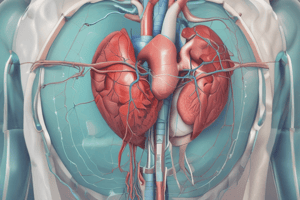Podcast
Questions and Answers
What is the primary purpose of using ultrasound in prenatal care?
What is the primary purpose of using ultrasound in prenatal care?
- To generate images of the heart
- To monitor heart conditions
- To assess the health of the fetus and monitor fetal development (correct)
- To detect neurological conditions
What technology is utilized to create detailed images of the brain and spinal cord in neurological assessments?
What technology is utilized to create detailed images of the brain and spinal cord in neurological assessments?
- MRI (correct)
- X-rays
- ECG
- CT-SCAN
Which machine is specifically employed to diagnose musculoskeletal injuries and conditions such as arthritis?
Which machine is specifically employed to diagnose musculoskeletal injuries and conditions such as arthritis?
- MRI (correct)
- CT-SCAN
- ECG
- Ultrasound
How has artificial intelligence (AI) enhanced medical imaging?
How has artificial intelligence (AI) enhanced medical imaging?
What benefit does 3D imaging and visualization provide in medical imaging?
What benefit does 3D imaging and visualization provide in medical imaging?
What is a major application of CRISPR-Cas9 technology?
What is a major application of CRISPR-Cas9 technology?
Which health innovation leverages the body's immune system to combat cancer cells?
Which health innovation leverages the body's immune system to combat cancer cells?
What was a major global health event caused by the SARS-CoV-2 virus?
What was a major global health event caused by the SARS-CoV-2 virus?
What is the primary focus of research into the gut microbiome?
What is the primary focus of research into the gut microbiome?
Which technology has significantly expanded its use during the COVID-19 pandemic?
Which technology has significantly expanded its use during the COVID-19 pandemic?
Study Notes
Enhancing Patient Care
- Non-invasive monitoring technologies improve patient care across various domains such as prenatal, cardiovascular, neurological, and musculoskeletal health.
Prenatal Care
- Ultrasound machines monitor fetal development and assess the health of the fetus.
- Early detection of complications during pregnancy is facilitated by ultrasound technology.
Cardiovascular Health
- ECG (Electrocardiography) utilizes ultrasound waves to create images of the heart for condition monitoring.
- Essential for diagnosing heart-related issues and monitoring ongoing conditions.
Neurological Conditions
- MRI (Magnetic Resonance Imaging) and CT scans are key diagnostic tools for neurological conditions.
- These imaging technologies provide detailed images of the brain and spinal cord, aiding in precise diagnosis.
Musculoskeletal Health
- X-rays, MRI, and ultrasound are employed to diagnose and monitor injuries, arthritis, and bone fractures.
- Offers a non-invasive approach to assessing musculoskeletal issues.
Research Development in Medical Imaging Technologies
- Artificial Intelligence (AI): Developed for advanced analysis of medical images, enhancing diagnostic accuracy.
- 3D Imaging and Visualization: Provides detailed and immersive views of anatomical structures for better diagnosis.
- Molecular Imaging: Offers sensitive and specific information, crucial for understanding disease processes.
21st Century Major Health Concerns
- COVID-19: Caused by the SARS-CoV-2 virus; emerged as a global pandemic in 2019.
- Ebola Virus Disease: Significant outbreak in West Africa from 2014 to 2016.
- Zika Virus: Linked to severe birth defects; outbreak in Brazil in 2010, transmitted by mosquitoes.
- Antibiotic-Resistant Infections: Rising bacterial resistance leading to "superbugs."
Major Health Discoveries and Innovations
- Precision Medicine: Customizes medical treatment to suit individual patient characteristics.
- CRISPR-Cas9 Gene Editing: Revolutionary technology for precise gene editing with potential for treating genetic disorders.
- Artificial Intelligence and Machine Learning: Employed in diagnostics and treatment planning, enhancing health care delivery.
- Immunotherapy: A cancer treatment strategy that utilizes the immune system to target cancer cells.
- Wearable Health Technology: Devices like smartwatches aid in monitoring health metrics and managing chronic conditions.
- Gut Microbiome Research: Reveals the importance of gut health in relation to digestion, immunity, and mental health.
- Telemedicine: Gained traction during the COVID-19 pandemic, enabling remote healthcare services.
Guiding Treatment
- Interventional Radiology: Provides treatment for diseases through minimal incisions, enhancing patient comfort.
- Guided Biopsy: Tissue sampling for accurate diagnosis; useful when imaging cannot identify abnormalities.
- Minimally Invasive Surgeries: Reduce recovery time and pain, exemplified by techniques like laparoscopy.
Monitoring Disease Progression
- Baseline Imaging: Establishes initial health conditions, guiding subsequent treatments.
- Follow-up Imaging: Tracks changes in a patient’s condition, essential for assessing treatment effectiveness.
- Treatment Adjustments: Physicians adapt treatment plans based on the latest imaging data and patient responses.
Studying That Suits You
Use AI to generate personalized quizzes and flashcards to suit your learning preferences.
Related Documents
Description
This quiz explores the advancements in non-invasive monitoring techniques and personalized treatment plans across various medical fields, including prenatal care, cardiovascular health, neurological conditions, and musculoskeletal disorders. It examines the role of different machines such as Ultrasound, ECG, and MRI in enhancing patient care.




